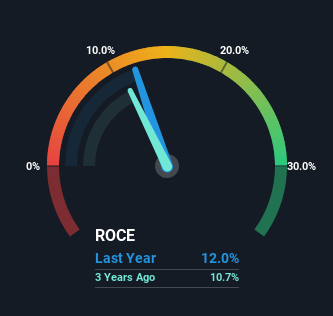- India
- /
- Hospitality
- /
- NSEI:JUBLFOOD
Jubilant FoodWorks (NSE:JUBLFOOD) Could Be Struggling To Allocate Capital

Finding a business that has the potential to grow substantially is not easy, but it is possible if we look at a few key financial metrics. Ideally, a business will show two trends; firstly a growing return on capital employed (ROCE) and secondly, an increasing amount of capital employed. Basically this means that a company has profitable initiatives that it can continue to reinvest in, which is a trait of a compounding machine. Although, when we looked at Jubilant FoodWorks (NSE:JUBLFOOD), it didn't seem to tick all of these boxes.
Understanding Return On Capital Employed (ROCE)
Just to clarify if you're unsure, ROCE is a metric for evaluating how much pre-tax income (in percentage terms) a company earns on the capital invested in its business. Analysts use this formula to calculate it for Jubilant FoodWorks:
Return on Capital Employed = Earnings Before Interest and Tax (EBIT) ÷ (Total Assets - Current Liabilities)
0.12 = ₹5.3b ÷ (₹55b - ₹11b) (Based on the trailing twelve months to December 2023).
Therefore, Jubilant FoodWorks has an ROCE of 12%. That's a relatively normal return on capital, and it's around the 11% generated by the Hospitality industry.
View our latest analysis for Jubilant FoodWorks

In the above chart we have measured Jubilant FoodWorks' prior ROCE against its prior performance, but the future is arguably more important. If you'd like to see what analysts are forecasting going forward, you should check out our free analyst report for Jubilant FoodWorks .
How Are Returns Trending?
In terms of Jubilant FoodWorks' historical ROCE movements, the trend isn't fantastic. Over the last five years, returns on capital have decreased to 12% from 35% five years ago. On the other hand, the company has been employing more capital without a corresponding improvement in sales in the last year, which could suggest these investments are longer term plays. It may take some time before the company starts to see any change in earnings from these investments.
On a related note, Jubilant FoodWorks has decreased its current liabilities to 20% of total assets. So we could link some of this to the decrease in ROCE. What's more, this can reduce some aspects of risk to the business because now the company's suppliers or short-term creditors are funding less of its operations. Some would claim this reduces the business' efficiency at generating ROCE since it is now funding more of the operations with its own money.
What We Can Learn From Jubilant FoodWorks' ROCE
To conclude, we've found that Jubilant FoodWorks is reinvesting in the business, but returns have been falling. Although the market must be expecting these trends to improve because the stock has gained 62% over the last five years. But if the trajectory of these underlying trends continue, we think the likelihood of it being a multi-bagger from here isn't high.
One final note, you should learn about the 2 warning signs we've spotted with Jubilant FoodWorks (including 1 which is a bit unpleasant) .
If you want to search for solid companies with great earnings, check out this free list of companies with good balance sheets and impressive returns on equity.
New: Manage All Your Stock Portfolios in One Place
We've created the ultimate portfolio companion for stock investors, and it's free.
• Connect an unlimited number of Portfolios and see your total in one currency
• Be alerted to new Warning Signs or Risks via email or mobile
• Track the Fair Value of your stocks
Have feedback on this article? Concerned about the content? Get in touch with us directly. Alternatively, email editorial-team (at) simplywallst.com.
This article by Simply Wall St is general in nature. We provide commentary based on historical data and analyst forecasts only using an unbiased methodology and our articles are not intended to be financial advice. It does not constitute a recommendation to buy or sell any stock, and does not take account of your objectives, or your financial situation. We aim to bring you long-term focused analysis driven by fundamental data. Note that our analysis may not factor in the latest price-sensitive company announcements or qualitative material. Simply Wall St has no position in any stocks mentioned.
About NSEI:JUBLFOOD
High growth potential with proven track record and pays a dividend.

